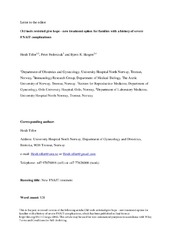Blar i forfatter "Tiller, Heidi"
-
Antenatal intravenous immunoglobulins in pregnancies at risk of fetal and neonatal alloimmune thrombocytopenia: comparison of neonatal outcome in treated and nontreated pregnancies
Ernstsen, Siw Leiknes; Ahlen, Maria Therese; Johansen, Tiril; Bertelsen, eirin listau; Kjeldsen-Kragh, Jens; Tiller, Heidi (Journal article; Tidsskriftartikkel; Peer reviewed, 2022-04-29)BACKGROUND: Maternal alloantibodies to human platelet antigen-1a can cause severe intracranial hemorrhage in a fetus or newborn. Although never evaluated in placebo-controlled clinical trials, most Western countries use off-label weekly administration of high-dosage intravenous immunoglobulin in all pregnant women with an obstetrical history of fetal and neonatal alloimmune thrombocytopenia. In ... -
Anti-human platelet antigen (HPA)-1a antibodies may affect trophoblast functions crucial for placental development: A laboratory study using an in vitro model
Eksteen, Mariana; Heide, Gøril; Tiller, Heidi; Zhou, Yan; Nedberg, Nora Hersoug; Martinez-Zubiaurre, Inigo; Husebekk, Anne; Skogen, Bjørn Ragnar; Stuge, Tor Brynjar; Kjær, Mette (Journal article; Tidsskriftartikkel; Peer reviewed, 2017-04-21)Background: Fetal and neonatal alloimmune thrombocytopenia (FNAIT) is a bleeding disorder caused by maternal antibodies against paternal human platelet antigens (HPAs) on fetal platelets. Antibodies against HPA-1a are accountable for the majority of FNAIT cases. We have previously shown that high levels of maternal anti-HPA-1a antibodies are associated with clinically significant reduced birth ... -
A combined effect of anti-HPA-1a and anti-HLA Class I in pregnancy?
Dahl, Jesper; Skogen, Bjørn; Kjær, Mette; Husebekk, Anne; Kjeldsen-Kragh, Jens; Tiller, Heidi (Journal article; Tidsskriftartikkel; Peer reviewed, 2020-06-30)<i>Background</i> - Maternal anti–human leukocyte antigen (HLA) Class I is commonly detected alongside anti–human platelet antigen (HPA)-1a in fetal and neonatal alloimmune thrombocytopenia (FNAIT). Little is known regarding whether the presence of anti-HLA Class I may exert an additive effect on the risk and severity of FNAIT.<br><br> <i>Methods and Materials</i> - We reanalyzed samples originally ... -
Current perspectives on fetal and neonatal alloimmune thrombocytopenia - Increasing clinical concerns and new treatment opportunities
Tiller, Heidi; Husebekk, Anne; Ahlen, Maria Therese; Stuge, Tor Brynjar; Skogen, Bjørn Ragnar (Journal article; Tidsskriftartikkel; Peer reviewed, 2017-04-19)Differences in platelet type between the fetus and the mother can lead to maternal immunization and destruction of the fetal platelets, a condition named fetal and neonatal alloimmune thrombocytopenia (FNAIT). FNAIT is reported to occur in ~1 per 1,000 live born neonates. The major risk is intracranial hemorrhage in the fetus or newborn, which is associated with severe neurological ... -
Fetal and neonatal alloimmune thrombocytopenia - The Norwegian management model
Tiller, Heidi; Ahlen, Maria Therese; Akkøk, Cigdem Ahaein; Husebekk, Anne (Journal article; Tidsskriftartikkel; Peer reviewed, 2019-12-31)In Norway, the management strategy for fetal and neonatal alloimmune thrombocytopenia (FNAIT) has for more than two decades differed from most other countries. The focus of this paper is to describe and discuss the Norwegian FNAIT management program. We recommend antenatal IVIg to women who previously have had a child with FNAIT-induced ICH, and usually not to HPA-1a alloimmunized pregnant women ... -
Fetal exposure to maternal human platelet antigen-1a does not induce tolerance. An analytical observational study
Kjær, Mette; Tiller, Heidi; Heide, Gøril; Kjeldsen-Kragh, Jens; Skogen, Bjørn Ragnar; Husebekk, Anne (Journal article; Tidsskriftartikkel; Peer reviewed, 2017-08-24)Fetal and neonatal alloimmune thrombocytopenia (FNAIT) is a disease that may cause severe bleeding complications with risk of perinatal death or lifelong disability. The main cause of FNAIT is maternal antibodies against human platelet antigen (HPA)-1a. Both fetomaternal bleeding and transplacental trafficking of fetal cells during pregnancy could be the cause of alloimmunization. Persistence of ... -
Old tools revisited give hope - new treatment option for families with a history of severe FNAIT complications.
Tiller, Heidi; Fedorcsák, Péter; Skogen, Bjørn Ragnar (Journal article; Tidsskriftartikkel; Peer reviewed, 2016-01-14) -
Platelet alloimmunization is associated with low grade chronic histiocytic intervillositis - A new link to a rare placental lesion?
Nedberg, Nora Hersoug; Turowski, Gitta Erika; Guz, Katarzyna; Przytuła, Ewa; Uhrynowska, Małgorzata; Roald, Borghild; Husebekk, Anne; Sitras, Vasilis; Nystad, Mona; Dębska, Marzena; Brojer, Ewa; Tiller, Heidi (Journal article; Tidsskriftartikkel; Peer reviewed, 2021-07-23)<i>Introduction</i> - Maternal alloimmunization against human platelet antigen (HPA)-1a has been implied to mediate both reduced birth weight and chronic placental inflammation. Fetal growth restriction is associated with different types of chronic inflammation in the placenta, mainly chronic histiocytic intervillositis and chronic villitis. The aim of this prospective study was to do a systematic ... -
Pregnant Women at Low Risk of Having a Child with Fetal and Neonatal Alloimmune Thrombocytopenia Do Not Require Treatment with Intravenous Immunoglobulin
Kjeldsen-Kragh, Jens; Bein, Gregor; Tiller, Heidi (Journal article; Tidsskriftartikkel; Peer reviewed, 2023-08-24)Fetal and neonatal alloimmune thrombocytopenia (FNAIT) is a rare condition in which maternal alloantibodies to fetal platelets cause fetal thrombocytopenia that may lead to intracranial hemorrhage (ICH). Off-label intravenous immunoglobulin (IVIg) has for 30 years been the standard of care for pregnant women who previously have had a child with FNAIT. The efficacy of this treatment has never ... -
What's with the boys? Lower birth weight in boys from HPA-1a alloimmunized pregnancies – New insights from a large prospective screening study in Poland
Coucheron, Tina; Uhrynowska, Malgorzata; Guz, Katarzyna; Orzińska, Agnieszka; Debska, Marzena; Gierszon, Agnieszka; Ahlen, Maria Therese; Bertelsen, eirin listau; Berge, gerd; Husebekk, Anne; Brojer, Ewa; Tiller, Heidi (Journal article; Tidsskriftartikkel; Peer reviewed, 2023-11-07)Fetomaternal incompatibility in human platelet antigens (HPAs) can cause maternal alloimmunization, which in turn may lead to thrombocytopenia with or without intracranial hemorrhage (ICH) in the fetus or newborn. Retrospective studies suggest that boys from alloimmunized mothers may have higher risk of ICH and lower birth weight than girls. The objective of this study was to assess how maternal ...


 English
English norsk
norsk








